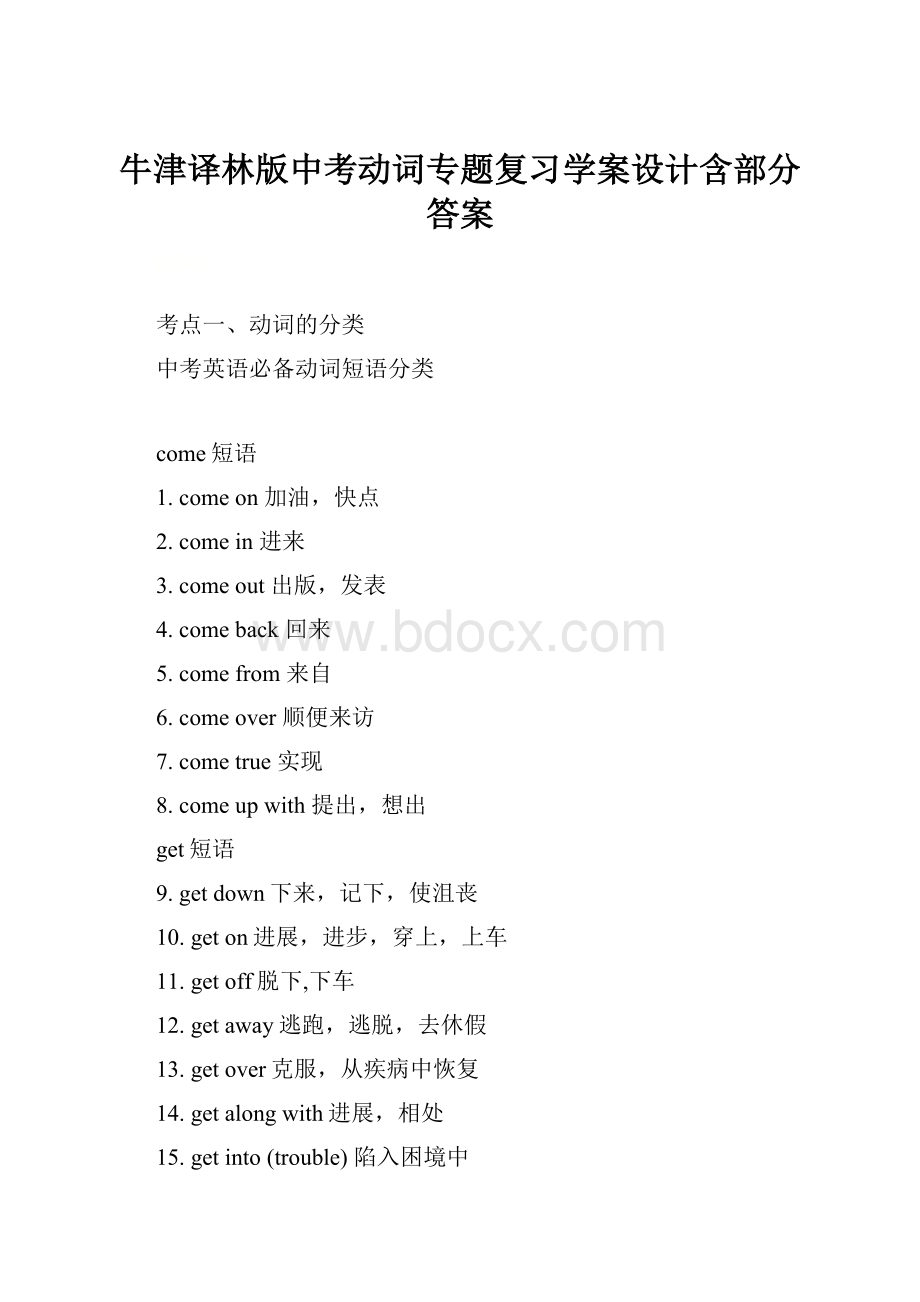牛津译林版中考动词专题复习学案设计含部分答案.docx
《牛津译林版中考动词专题复习学案设计含部分答案.docx》由会员分享,可在线阅读,更多相关《牛津译林版中考动词专题复习学案设计含部分答案.docx(26页珍藏版)》请在冰豆网上搜索。

牛津译林版中考动词专题复习学案设计含部分答案
考点一、动词的分类
中考英语必备动词短语分类
come短语
1.comeon加油,快点
2.comein进来
3.comeout出版,发表
4.comeback回来
5.comefrom来自
6.comeover顺便来访
7.cometrue实现
8.comeupwith提出,想出
get短语
9.get down下来,记下,使沮丧
10.get on进展,进步,穿上,上车
11.get off脱下,下车
12.get away逃跑,逃脱,去休假
13.get over克服,从疾病中恢复
14.get along with进展,相处
15.get into (trouble) 陷入困境中
16.get back取回,收回
17.getto到达
18.getin收割
give短语
19.giveaway捐赠
20.giveback归还
21.givein屈服,让步
22.giveout分发,散发
23.giveup放弃
pick短语
24.pick up拾起,捡起,拿起,收听,用车接送客人、货物,收拾、整理
25.pick out挑选
take短语
26.take off(飞机)起飞,脱掉(衣服)
27.take in吸收,上当;改小衣服
28.take away拿走
29.take out取出
30.take on雇佣,呈现
31.take down取下
32.take up占据时间、空间,开始从事,拿起
33.take time 花费(时间)
34.take turns 轮流
35.take it easy别着急,慢慢来
put短语
36.put up张贴,举起
37.put out伸出,扑灭
38.put off推迟
39.put away放好,存钱
40.put down记下,平息
41.put on穿戴,上映,
42.put aside放到一边
down短语
43.break down 坏了,垮了,分解
44.take down 记下,记录
45.turn down 调小,拒绝
46.cut down 削减,砍倒
47.pass down 传下来
48.put down 记下,写下,镇压
49.calm down 平静下来
50.come down 下落,传下
out短语
51.break out 爆发
52.point out 指出
53.pick out 选出
54.figure out 算出,理解
55.carry out 执行,进行
56.hold out 坚持下去
57.set out 出发,着手,摆放
58.turn out 结果是,生产,培养
59.make out 理解,看清楚
60.come out 出版,出来
up短语
61.grow up 成长,长大
62.give up 放弃,献出
63.build up 建立
64.set up 架起、建立
65.put up 搭起,架起,安装,住宿,张贴,盖起
66.pick up 拾起,学会,用车,来接,收听到
67.bring up 抚养,呕吐,提出 出现
68.turn up 开大(音量等)
69.stay up 挺住,熬夜
70.take up 开始学,从事,占据
71.make up构成,组成 编造 弥补
72.speed up 加快速度
73.look up 查找,找出
74.catch up 赶上
75.hold up 耽搁,使停顿
76.break up 分解
情态动词
考点二、情态动词概述:
(一)不同情态动词的否定意义
情态动词的否定形式
词义
问答
Needn’t
不必
Youneedn’tmeethimunlessyou’dliketo.
用于must/need提问的否定回答
—MustIdoitatonce?
—No,youneedn’t./don’thaveto.
Mustn’t
禁止
Peopleunder18yearsoldmustn’tgoinside.
用于can/may提问表要求,请求时的否定回答
—May/CanIdancehere?
—No,youmustn’t(can’t).
Can’t
不可能,
一定不是
Hecan’tbeill.Heisplayingbasketball
用于“MayI…?
”问句的否定回答
—MayIcomein?
—No,youcan’t.
Maynot
可能不
Hemaynotgettherightaddress.
不用于回答
(二)情态动词辨析:
1.can和may
(1)在肯定句中用may不用can;
(2)在疑问句中用can不用may;
(3)在否定句中,若语气肯定,表示“不可能”时用cannot,若语气不肯定,表示“可能不”时用maynot
2.haveto和must
(1)、haveto表示客观的需要,must表示说话人主观上的必要。
Mybrotherwasveryill,soIhadtocallthedoctorinthemiddleofthenight.
我弟弟病得很厉害,我只得半夜里把医生请来。
Hesaidthattheymustworkhard.他说他们必须努力工作。
(2)、在否定结构中:
don‘thaveto 表示“不必”
mustn’t 表示“禁止”
你不一定要把此事告诉他。
Youdon‘thavetotellhimaboutit.
你一定不要把这件事告诉他。
Youmustn’ttellhimaboutit.
【中考真题演练】
1.—_____Iknowbywhattimeyouwanttheprojecttobedone?
—Bythedayaftertomorrow._______youfinishitontime?
A.May;Can B.Must;Need C.Could;Must D.Need;Would
【答案】A
2.—Who’ssinginginthegarden?
—It______beMr.Brown.Healwayspracticessingingatthistime.
A.must B.can’t C.need
【答案】A
3.I______followyou.Wouldyoupleaserepeatit?
A.can’t B.mustn’t C.needn’t D.shouldn’t
【答案】A
4.—MustIhandinmyhomeworknow,Mr.Smith?
—No,you_______.
A.can’t B.shouldn’t C.wouldn’t D.needn’t
【答案】D
5.—Excuseme,mayIkeepthebookalittlelonger?
—Sorry.You________returnittoday.
A.must B.mustn’t C.can D.can’t
【答案】A
6.—IsthemanoverthereMr.Brown?
—It______him.Hehasgoneto BraziltowatchtheFIFAWorldCup.
A.maynot B.can’tbe C.shouldn’t D.mustn’t
【答案】B
时态和语态
考点三、动词时态
(一)结构
1.一般现在时:
谓语动词用原形或第三人称单数。
2.一般过去时:
谓语用动词的过去式
3.一般将来时:
谓语用will/begoingto+do
4.现在进行时:
谓语用am/is/are+doing
5.现在完成时:
谓语用have/has+done
6.过去进行时:
谓语用were/was+doing
7.过去完成时:
谓语用had+done
8.过去将来时:
谓语用would或was/weregoingto+do
(二)动词各种时态的用法
1、一般现在时
与一般现在时连用的时间状语
1表示频度的副词always,often,usually,sometimes等。
2onSundays,onMondayafternoon,everyday,inthemorning,everyyear等时间状语。
③onceayear,twiceamonth,threetimesaweek之类的表示频率的词组。
【完成句子】:
Tomoftenhelpshisparentsdohouseworkathome.汤姆在家经常帮助父母做家务。
Ioftengotoschoolbybike.我经常骑自行车去上学。
Theearthgoesaroundthesun.地球绕着太阳转。
Ifitrainstomorrow,wewon’tgotothepark.如果明天下雨,我们就不去公园了。
2、一般过去时
和一般过去时连用的时间状语lastnight,yesterday,lastweek,someyearsago,in1995,inthepast,theotherday,atthattime,justnow等。
【完成句子】:
LastweekTommadeamodelplanewithhisfriendJack.上周汤姆和他的朋友杰克做了一个飞机模型。
Wevisitedthefactorylastweek.上周我们参观了那个工厂。
WhenIwasinthecountryside,Ioftenswamintheriver.当我在乡下时,我常常在河里游泳。
3、一般将来时
(1)与一般将来时连用的时间状语:
tomorrow,nextweek,inafewdays,nextSunday,in+一段时间,in2020等。
【完成句子】:
TheywillleaveforShanghainextweek.他们下周将去上海。
Whereshallwemeettomorrow?
明天我们在哪里会面?
Lookatthedarkclouds.Thereisgoingtobeastorm.看那些乌云,暴风雨就要来临了。
(客观迹象)
(2)常用bedoing表示将来结构的动词有go,come,leave,stay,start,begin等,表示即将发生或安排好要做的事情。
【完成句子】:
WeareleavingforLondon.我们就要动身去伦敦了。
Sheisgoingtheretomorrow.她明天要去那里。
(3)当主句为一般将来时态时,在if,assoonas,until,when等引导的状语从句中用一般现在时替代一般将来时。
【完成句子】:
Ifitdoesn’trainthisafternoon,we’llhaveafootballmatch.
如果今天下午不下雨,我们将进行一场足球比赛。
4、现在进行时
(1)连用的时间状语:
now,thesedays等或当句子中含有look,listen,canyousee,can’tyousee之类的暗示词时,要使用现在进行时
(2)go,leave,arrive,start等动词用现在进行时表示将来。
【完成句子】:
Mr.Greeniswritinganothernovel.格林先生正在写另一本小说。
Theyarestudyinghardthisterm.他们这学期学习一直很努力。
5、现在完成时
(1)常与下列词语连用:
a.already,yet,just,ever,never,before,recently等;
b.“since+时间点”或“for+时间段”所构成的表示一段时间的状语.
Ihavelivedhereformorethantwentyyears.我住这儿已经20多年了。
IhavelivedheresinceIwasborn..从我出生起我就住这儿。
(2)用于现在完成时的句型Itisthefirst/secondtime....that…结构中的从句部分,用现在完成时。
ItisthefirsttimethatIhavevisitedthecity.这是我第一次访问这城市。
Thisisthefirsttime(that)I'veheardhimsing. 这是我第一次听他唱歌。
(3)hasgoneto,hasbeento,hasbeenin
表示“已去了某地”,总之现在还未回来hasgoneto
表示“过去曾去过某地”,总之现在已不在该地hasbeento
表示“已在某地(待了多久)”hasbeenin
【完成句子】:
JimhasgonetoLondonwithhisfamily.Jim和他的家人去了伦敦。
HaveyoubeentoBeijingbefore?
你以前去过北京吗?
TheGreenshavebeeninChinafortwoyears.Greens一家在中国两年了。
(4)延续性动词与非延续性动词
将非延续性动词转化为延续性动词
非延续性动词
延续性动词
非延续性动词
延续性动词
buy
have
catchacold
haveacold
borrow
keep
puton
wear
open
beopen
getup
beup
close
beclosed
wakeup
beawake
begin/start
beon
fallasleep
beasleep
come
behere
lose
belost
go
beout
join
bein+组织机构/beamemberof+组织机构
finish
beover
leave
beawayfrom
die
bedead
arrive/reach
be(in)
【完成句子】:
Ihavebeenawayfromthisschoolforeightyears.我离开这所学校已八年了。
Hehaskeptmydictionaryfortwodays.他借用我的词典已两天了。
6、过去进行时
连用的词语:
a.过去的时间状语then,ateightlastnight,Atthismomentyesterday,thismorning;allday;fromninetotenlastevening,WhenIcametoseeherlasttime
b.与always等时间副词连用,表示过去频繁发生的习惯性动作,带有一定的感情色彩。
【完成句子】:
HewasreadingwhenIcamein.当我进来时,他正在读书。
IwasdoingmyhomeworkwhilemyparentswerewatchingTV.
当我父母看电视的时候,我正在做作业。
Alicewasalwayschanginghermind.艾丽丝总是在改变主意。
1.-Whatwereyoudoingthistimeyesterday?
(2011中考题)
-I______onthegrassanddrawingapicture.
A.sit B.sat C.amsitting D.wassitting
2.It______heavilywhenIleftthecinema.
A.rains B.willrain C.israining D.wasraining
7、过去完成时
与过去完成时连用的时间状语有:
bylastweek,bytheendoflastyear等
【完成句子】:
ShehadleftbythetimeIarrived.我到达以前,她已经离开了。
HehadlivedinShanghaifortenyearsbeforehecamehere.
在他来这之前,他已在上海住了十年了。
LiLeidiedyesterday.Hehadbeenagoodfriendofmine.李雷昨天去世了。
他是我一个好朋友。
8、过去将来时
go,come,leave,arrive,start等动词,其过去进行时表示过去按计划即将发生的动作
【完成句子】:
Hesaidhewouldbuysomefruitforhissister.他说他要给他妹妹买些水果。
Heaskedwhenthemeetingwouldend.他问会议什么时候结束。
Hesaidhewascomingthisevening.他说他今天晚上来。
【中考真题演练】
1.IknowalittleaboutThailand,asI___D____therethreeyearsago.
A.havebeen B.havegone
C.willgoD.went
2.—Linda,Icalledyouthismorning,butnobodyansweredthephone.
—I’msorry.I D footballwithmyfriendsthen.
A.playB.played
C.amplayingD.wasplaying
3.Theastronautissotiredthathe___A____forelevenhours.
A.hasbeenasleepB.hasfallenasleep
C.hasgonetobedD.hasgonetosleep
4.—Mycar B .Couldyoupleasegivemearidetomorrow?
—I’msorryIcan’t.I’m Londontomorrowmorning.
A.isnew;leaving
B.hasbrokendown;leavingfor
C.broke;leavingfor
D.isexpensive;leaving
5.IhavebeentoShanghai.I B therelastmonth.
A.goB.went
C.havegoneD.willgo
6.Travelingtospaceisnolongerjustadream.Russia___D__thefirsthotelinspaceinthenearfuture.
AbuildsB.willbuildC.buildDhasbuild
7.Where'sTom?
Hismother____A__himnow.(2011中考题)
A.islookingfor B.willlookfor C.haslookedfor D.looksfor
8.What’syourfatherdoingnow?
–He____D__theroom(2010中考题)
A.cleaned B.cleans C.hascleaned D.iscleaning
9.hereportersaidthattheUFO ___A___ easttowestwhenhesawit.
A. wastraveling B. traveled C. hadbeentraveling D. wastotravel
10.—WhatwereyoudoingwhenTonyphonedyou?
—Ihadjustfinishedmyworkand D totakeashower.
A. hadstarted B. started C.